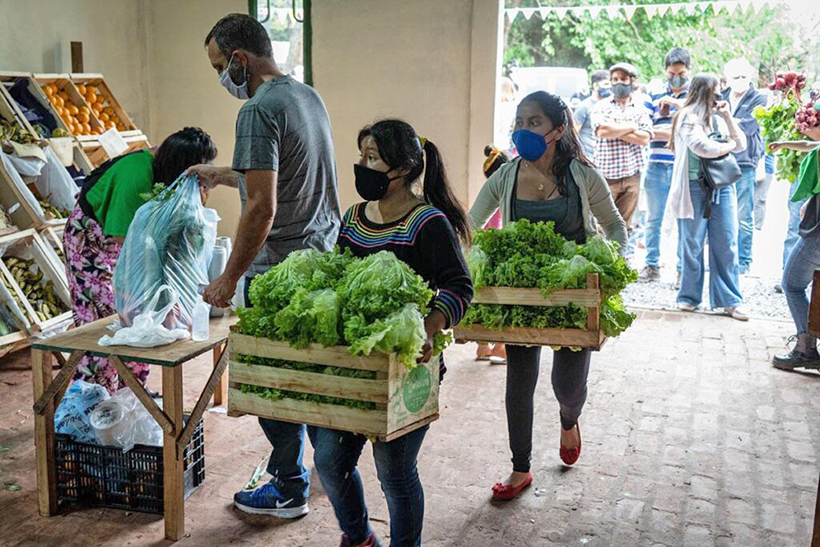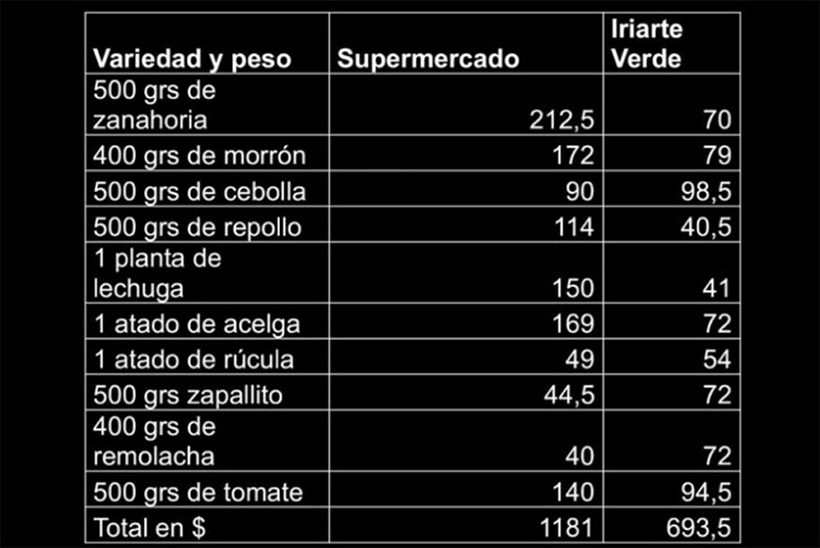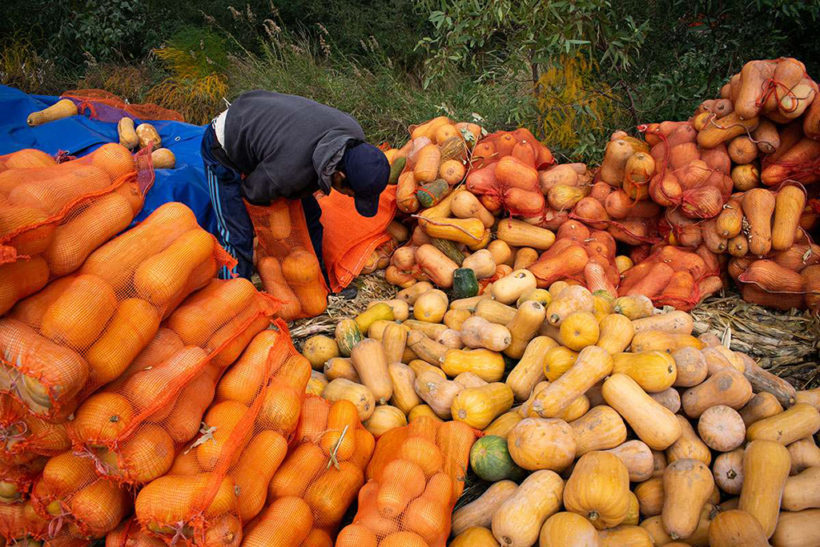Two economists, in a recent column published in the newspaper El Destape, have launched themselves into a series of prejudices about the production and commercialisation of agroecological fruit and vegetables. The Iriarte Verde cooperative has responded to the falsehoods published in the column with a well-founded response, not opinions. They also invite readers to compare prices and quality of what we put on our plates.
By Iriarte Verde
In the last few days, in our work cooperative – dedicated to creating distribution and marketing channels for agroecological and organic products at fair prices – a debate has arisen from a publication entitled “Agroecology and the reign of the free market”, signed by two economists with extensive formation. In it they make a series of assertions and conjectures about the field of agroecology, the environment and the organic market. With firm but unsubstantiated opinions, they offer their “opinion” on a subject that is not their speciality. We propose, therefore, to refute – on the basis of fundamentals and not opinions or beliefs – the falsehoods published and to give the responses of agroecology.
The authors of the column speak of a “sensationalist environmentalism” – a term that is not only prejudiced but also discriminatory – that “promotes preventive prohibition as a general solution”. Our demand for a ban on the use of poisons in food production has to do with the fact that “poison is poison”, as we were taught by Dr Andrés Carrasco, an eminent Argentinean scientist whose research – and others around the world – allowed the World Health Organisation (WHO), through its cancer research institute, to classify glyphosate as possibly carcinogenic in 2015.
Economists claim that “a state unable to control cannot ban either”. False: the state is able to control because it has the public bodies to do so. As far as food is concerned, there is INTA, SENASA, INAL and ANMAT. The State is not impotent, it has the necessary legislation to defend us against environmental pollution, such as the General Environmental Law, the Forestry Law, article 41 of the National Constitution, the Hazardous Waste Law, the Environmental Education Law.
The authors consider that “banning mining, agrochemicals, local salmon production, pig farms, offshore oil exploration” would have “very negative economic impacts” and “affects the activities that are supposedly more benevolent to nature”. We are going through the anthropocene era in which humanity and the capitalist system have advanced dangerously over the environment: we must rethink our way of relating to nature and reverse this process, now.
The world and our country are suffering the consequences: forest fires like those in Australia or those that occurred a few days ago in Corrientes and Misiones, among other parts of the country. We talk about “drought and lack of rain” as something that happens climatically, instead of addressing its causes and responsibilities. The discussion needs to focus on another axis: how to develop anthropic activities. Thinking about the development of societies taking into account their culture, their customs, and that the result of these activities should emerge from consensus and local participatory research.
The responses of agroecology as a science
In the publication, the authors ask whether it is possible to “trust that producers who wear the agroecological T-shirt (…) use the most environmentally and health-friendly practices”. We wonder why those who use poisons do not have to prove that their production does not constitute a danger to social and environmental health, but the agroecological producer is required to prove the healthiness of his food? All agroecological products are susceptible to analysis by the competent bodies. They are exposed to the same regulations as any other product.
Moreover, the economists raise another question: “How can we differentiate between products in the absence of regulations, and what if they are just different marketing strategies? The paragraph shows a lack of knowledge and reflects the fact that their assessments do not go beyond representing a clear primary stage of magical consciousness. Marketing strategy? Agroecology is a science and must be treated as such and, as we have been saying for years, each agroecological process has its own particularities, so it cannot be copied, imported or exported.

Photo by Sergio Goya/Agencia Tierra Viva
Agroecology is based on the respect of principles within the productive, social, environmental and economic spheres, which denotes that the vision of agroecology is holistic and not productivist. These principles from the different spheres must be strategically balanced in order to produce food that fulfils all the nutritional qualities.
For example, we can mention principles such as respect for biodiversity, the association and rotation of crops, the rescue and use of seed varieties, the non-use of pesticides, the non-use of chemical fertilisers, producer autonomy in the formation of the price of the food they produce, recognition of family and cooperative work, valuing popular knowledge, the application of appropriate technologies, guaranteeing the economic sustainability of the productive unit or group, and maintaining the life of the soil.
The authors of the column published in El Destape consider that there is a “campaign of fear that discredits conventional production based on the argument that food supposedly has toxic components, damages soils, cuts down forests, pollutes rivers”. The information provided to the public is based on the proven reality of the response from nature and competent bodies. We clarify that in the case of the use of glyphosate there are more than 1000 scientific publications around the world that demonstrate the environmental damage it causes, and yet it continues to be used.
The mudslides in Salta, the forest fires in Corrientes and Misiones, the floods in Entre Ríos, the cyanide contamination of the Jáchal River, the expulsion of ancestral populations for the clearing and planting of soybeans in Santiago del Estero and Chaco, among other examples, are nature’s response to arbitrary anthropic intervention.
Official control bodies provide us with reports that the perpetrators deny. At the request of the NGO Naturaleza de Derechos, Senasa provided the results of chromatographic analyses of vegetables already destined for sale, detecting the presence of chemical products. You can check it in the work entitled Vademecum toxicológico de la Argentina.
Also available is the work of the Cátedra de Soberanía Alimentaria de la Facultad de Nutrición de la UBA, where the participants of the Cátedra brought their samples purchased in their neighbourhood. The samples were analysed by the Espacio Multidisciplinario de Interacción Socio Ambiental (Emisa). The result was that 60 percent of the samples contained at least one poison.
Agroecology guarantees for producers and consumers
The economists demand certifications for the agroecological label and believe that the food “is not even subject to the certifications and bromatological controls that regulate conventional production”. They also doubt whether they are not the same as those offered by agribusiness, with a “marketing cartel”. The mechanism to avoid this conflict is the participatory guarantee system. Environmental impact assessment by local governments, control by SENASA or monitoring by local ministries of production.
In their column, the economists continue: “Those who honestly grow food without the use of agrochemicals based on different practices, such as certified organic producers, do not have sufficient volumes to serve mass markets. Nor can they meet the demand by matching the prices of conventional production”.
On this point, the lack of knowledge is even greater considering that both authors should be used to dealing with figures and statistics. According to the Area of Organic Production of the Directorate of Strategy and Risk Analysis of Senasa’s National Directorate of Agri-Food Safety and Quality, “of the total of 132,000 tonnes of certified organic products, 97 percent (128.6 thousand tonnes) were destined for export. The main markets to which Argentine organic produce was sent were the European Union and the United States, while the local market continues to show signs of growth. One of the objectives of organic food production is export.
Agroecology produces for the domestic market, making it the only way to supply the population with healthy, safe and sovereign food. Currently, cereals, oilseeds, fruits, vegetables, meat, dairy products and honey, among others, are produced under the agroecological system. In addition, in 2020, the creation of the National Agroecology Directorate was made official. Its main objective is to “intervene in the design and implementation of policies, programmes and projects that promote intensive and extensive agroecological-based primary production at all scales”, coordinating with producers, agricultural organisations and municipal and provincial governments.
Fair prices, another axis of agroecology
The price of agroecological food has to consider a fair price for the producer and the consumer. It is up to the consumer to decide what and where to buy and how much to pay. The conception of what is cheap and what is expensive is a market construct and is relative.
The authors of the column published in El Destape ask readers to “take the trouble to choose in any greengrocer’s shop the same products contained in an agroecological bag and compare prices (…) and we could also find out if these activities pay taxes and if the payroll of their workers is properly registered”.
As we are also readers of El Destape, we took the trouble to compare prices between a bag of ten varieties of vegetables from a supermarket in Buenos Aires and the one we offer in our Worker Cooperative Iriarte Verde Ltda (CABA):

We also want to make it clear that we do not know if the supermarket we use for comparison pays taxes, has its workers registered, if it pays a fair price to the producers, and if it is sure of the food it offers. In the case of the Cooperativa de Trabajo Iriarte Verde, we look forward to your visit to the Almacén Agroecológico in the Barracas neighbourhood and invite you to join the struggle for food sovereignty. To give your opinion, you have to investigate and know. In order not to publish falsehoods, you have to know the truth.












